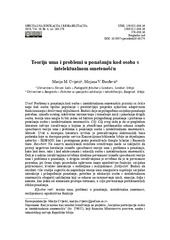Приказ основних података о документу
Teorija uma i problemi u ponašanju kod osoba s intelektualnom ometenošću
Theory of mind and problem behavior in people with intellectual disability
| dc.creator | Cvijetić, Marija | |
| dc.creator | Đorđević, Mirjana | |
| dc.date.accessioned | 2021-06-09T14:30:36Z | |
| dc.date.available | 2021-06-09T14:30:36Z | |
| dc.date.issued | 2020 | |
| dc.identifier.issn | 1452-7367 | |
| dc.identifier.uri | http://rfasper.fasper.bg.ac.rs/handle/123456789/1246 | |
| dc.description.abstract | Introduction. Behavioral problems are more common in people with intellectual disability than in typical population and present an obstacle to their adaptive functioning and social inclusion. Since adjusted social behavior requires, among other things, an adequate understanding and interpretation of thoughts and behavior of others, theory of mind could be one of the factors of adjusted behavior and behavioral problems in people with intellectual disability. Objective. The aim of this paper is to single out the research in which the issue of the relationship between the ability of theory of mind and behavioral problems of people with intellectual disabilities has been addressed, through a literature review. Methods. Insight into the available literature was performed by searching the electronic databases that are available through the services of the Serbian Library Consortium for Coordinated Acquisition - KOBSON, as well as through Google Scholar and Research Gate. Results. Based on the analyzed research results, it can be concluded that there is a negative correlation between theory of mind and behavioral problems, both in children and in adolescents and adults with intellectual disabilities. While some studies have found a direct link between theory of mind and behavioral problems, others have found that this link is indirect, whereby the role of intermediaries tend to have executive functions, social acceptance, quality of parental interaction and resilience. Conclusion. Since the results of several studies suggest that more advanced theory of mind enables more successful social interactions and more adjusted behavior, it is necessary to enrich the education of people with intellectual disability with contents related to understanding thoughts, emotions, desires and intentions, as one of the elements of approach to treatment, in order to prevent problematic behaviors. | en |
| dc.description.abstract | Problemi u ponašanju kod osoba s intelektualnom ometenošću prisutni su češće nego kod osoba tipične populacije i predstavljaju prepreku njihovom adaptivnom funkcionisanju i društvenoj uključenosti. Budući da je za prilagođeno socijalno ponašanje potrebno, između ostalog, adekvatno razumevanje i tumačenje misli i ponašanja drugih osoba, teorija uma mogla bi biti jedan od faktora prilagođenog ponašanja i problema u ponašanju osoba s intelektualnom ometenošću. Cilj: Cilj ovog rada je da se pregledom literature izdvoje istraživanja u kojima je obrađivana problematika odnosa između sposobnosti teorije uma i problema u ponašanju osoba s intelektualnom ometenošću. Metode: Uvid u dostupnu literaturu izvršen je pretraživanjem elektronskih baza podataka koje su dostupne preko servisa Konzorcijuma biblioteka Srbije za objedinjenu nabavku - KOBSON, kao i pretragama preko pretraživača Google Scholar i Research Gate. Rezultati: Na osnovu analiziranih rezultata istraživanja može se zaključiti da postoji negativna korelacija između sposobnosti teorije uma i problema u ponašanju, kako kod dece, tako i kod adolescenata i odraslih osoba s intelektualnom ometenošću. Dok je u nekim istraživanjima utvrđena direktna povezanost između sposobnosti teorije uma i problema u ponašanju, u drugim istraživanjima je utvrđeno da je ta povezanost posredna, pri čemu ulogu posrednika uglavnom imaju egzekutivne funkcije, socijalna prihvaćenost, kvalitet interakcije s roditeljima i rezilijentnost. Zaključak: Budući da rezultati više studija sugerišu da naprednija teorija uma omogućava uspešnije socijalne interakcije i prilagođenije ponašanje, potrebno je edukaciju osoba s intelektualnom ometenošću obogatiti sadržajima koji se odnose na razumevanje misli, emocija, želja i namera, kao jedan od elemenata pristupa tretmanu, u cilju preveniranja problematičnih oblika ponašanja. | sr |
| dc.publisher | Univerzitet u Beogradu - Fakultet za specijalnu edukaciju i rehabilitaciju, Beograd | |
| dc.relation | info:eu-repo/grantAgreement/MESTD/Basic Research (BR or ON)/179017/RS// | |
| dc.rights | openAccess | |
| dc.rights.uri | https://creativecommons.org/licenses/by-sa/4.0/ | |
| dc.source | Specijalna edukacija i rehabilitacija | |
| dc.subject | theory of mind | en |
| dc.subject | behavioral problems | en |
| dc.subject | intellectual disability | en |
| dc.subject | resilience | en |
| dc.subject | executive functions | en |
| dc.subject | teorija uma | sr |
| dc.subject | problemi u ponašanju | sr |
| dc.subject | intelektualna ometenost | sr |
| dc.subject | rezilijentnost | sr |
| dc.subject | egzekutivne funkcije | sr |
| dc.title | Teorija uma i problemi u ponašanju kod osoba s intelektualnom ometenošću | en |
| dc.title | Theory of mind and problem behavior in people with intellectual disability | sr |
| dc.type | article | |
| dc.rights.license | BY-SA | |
| dc.citation.epage | 278 | |
| dc.citation.issue | 4 | |
| dc.citation.other | 19(4): 263-278 | |
| dc.citation.rank | M51 | |
| dc.citation.spage | 263 | |
| dc.citation.volume | 19 | |
| dc.identifier.doi | 10.5937/specedreh19-30274 | |
| dc.identifier.fulltext | http://rfasper.fasper.bg.ac.rs/bitstream/id/212/1243.pdf | |
| dc.identifier.scopus | 2-s2.0-85104227276 | |
| dc.type.version | publishedVersion |


